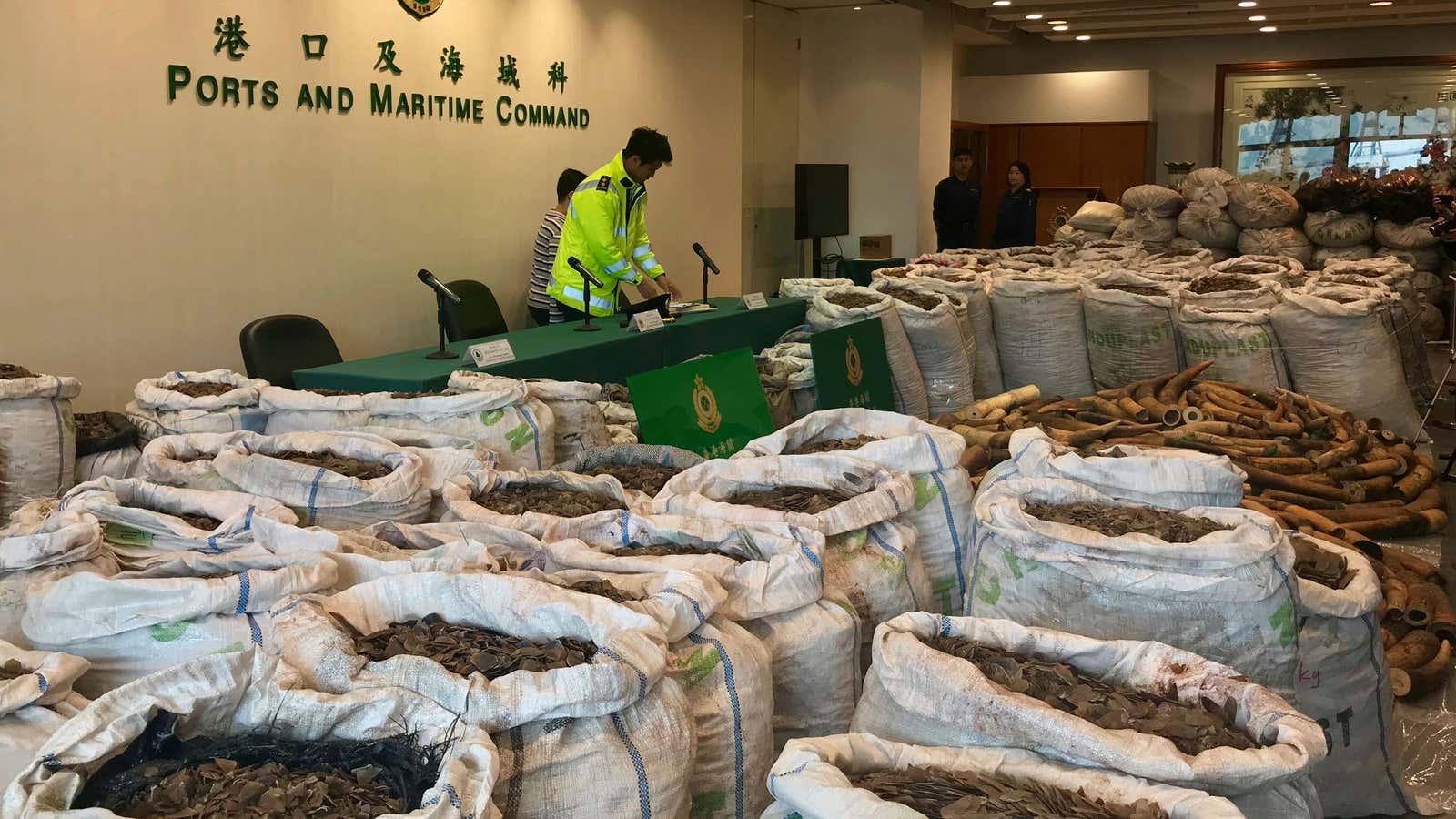Despite actions taken to protect the pangolin—the world’s most trafficked mammal—Hong Kong keeps seizing ever-growing hauls of the animal.
Customs officials in the city said yesterday (Jan. 31) they have confiscated pangolin scales as well as ivory tusks worth more than HK$62 million ($8 million) in a shipping container from Nigeria. Of the haul, 8.2 tonnes (9 tons) were pangolin scales worth an estimated HK$42 million ($5 million), making it the city’s biggest seizure ever of pangolins by value and weight, authorities said. The scales likely came from some 14,000 pangolins.
The cargo was bound for Vietnam or China, where pangolin scales are highly sought after for use in traditional medicine, as it’s believed that the mammal’s scales can cure illnesses such as asthma, cancer, and reproductive problems.
“It is clearly impossible that the pangolin species can withstand such high rates of poaching, trafficking, and trade. Eight tonnes is outrageous,” said Alex Hofford, a Hong Kong-based campaigner with non-profit group WildAid.
According to local media reports, the cargo was marked as frozen meat, but after receiving a tip-off from mainland Chinese authorities, customs officials took an X-ray scan of the goods and then took four hours to break through the layers of meat and ice to get to the trafficked items. Unlike ivory or tiger pelts, which are easily recognizable, pangolins are usually killed, skinned, and frozen before being sold. That makes it harder for customs to tell them apart from fish and snakes, which are often mixed with pangolins as cover.
Hong Kong customs officials said they confiscated more than 17 tonnes of pangolin scales in 2018, double that of 2017. Until yesterday’s seizure, the biggest haul of pangolin scales in Hong Kong happened two years ago, when customs found 7 tonnes of pangolin scales in a shipping container from Nigeria. The African country accounted for 17% of the total volume of pangolin scales seized between 2013 and 2017 in Hong Kong, according to a report published by ADM Capital Foundation, a Hong Kong-based group that promotes environmental conservation.
Sophie Le Clue, director of the environmental program at ADM, said that the “massive increase” in pangolin seizures in the past five years “signal the likely extinction of the species.”
The seizure comes despite a series of efforts by the international community in recent years to combat the smuggling of pangolins. International trade in pangolins was completely banned in 2016, after the animal received the highest level of protection against illegal trading by the Convention on International Trade in Endangered Species. Mainland Chinese authorities have also stepped up efforts to combat the trade in pangolins, including launching an investigation into pangolin consumption by government officials in 2017. However, pangolin scales keep flowing into China amid a government-backed push to promote traditional medicine in recent years, and as demand for such items grow as people become wealthier in China.
Hong Kong is also a trading hub for ivory and other endangered animals and their products, including pangolins, rhino horns, reef fish, and Japanese eel (paywall). The city, however, passed a bill to outlaw ivory trading by the end of 2021, although smuggling is expected to move other hubs such as Chinese neighbor Laos, which has become the world’s fastest-growing ivory market.
Amanda Whitfort, who teaches law at the University of Hong Kong, said relatively lax law enforcement keeps the wildlife trade alive in the city. “Less than 1% of seizures from shipping containers results in a criminal prosecution in Hong Kong,” she said. “Wildlife crime is the fourth-most lucrative black market in the world, and while the criminals behind the trade remain unchallenged and unpunished, critically endangered animals, like pangolins, will remain unprotected.”
